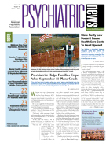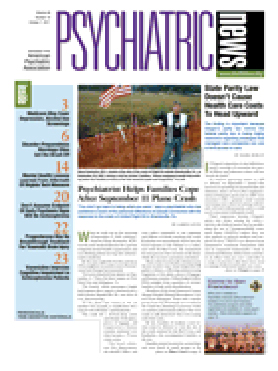When people have a few symptoms of psychosis, they may be at risk of developing schizophrenia or schizoaffective disorder.
The transition rate from subclinical psychosis to full-blown psychosis today is 15 percent to 20 percent, according to data from psychosis early-recognition programs.
Yet having preclinical or subclinical psychosis symptoms may signal something else—for example, encroaching bipolar disorder, dysthymia, obsessive-compulsive disorder, or social phobia.
This finding comes from a study published in the September Schizophrenia Research led by Wulf Roessler, M.D., a professor of psychiatry at the University of Zurich in Switzerland.
Roessler and his colleagues recruited 591 young adults from the general Zurich population for their longitudinal study. When the study started in 1978, the subjects were aged 19 or 20, and when the study ended in 2008, they were aged 49 or 50.
In 1978, the researchers used a slightly modified version of the Symptom Checklist-90-Revised (SCL-90-R) to evaluate subjects for psychotic symptoms—that is, schizotypal signs and schizophrenia nuclear symptoms. Schizotypal signs included blaming others for their troubles, feeling most people cannot be trusted, believing that others don't give the person proper credit, feeling lonely even when with people, and never feeling close to another person. Schizophrenia nuclear symptoms included hearing voices that other people do not hear, believing that someone else can control your thoughts, believing that others are aware of your thoughts, and believing that thoughts you experience are not your own.
The researchers also used an instrument called the Structured Psychopathological Interview and Rating of the Social Consequences of Psychological Disturbances for Epidemiology (SPIKE) to evaluate subjects for various DSM-III and DSM-IV mental disorders through seven interview waves from 1979 to 2008. (The researchers noted that the SPIKE was not able to assess individuals for schizophrenia or schizoaffective disorder, so they did not know how many subjects could be diagnosed with those disorders.)
They then determined whether there were significant links between schizotypal signs and schizophrenia nuclear symptoms at the start of the study and development of various mental disorders during the subsequent years.
They did find that such links existed. Schizotypal signs were significantly linked with later development of bipolar disorder, dysthymia, obsessive-compulsive disorder, panic disorder, simple phobia, and social phobia. Schizophrenia nuclear symptoms were linked with development of substance-use disorders, obsessive-compulsive disorder, and social phobia.
Moreover, higher scores on measures of schizotypal signs or schizophrenia nuclear symptoms were associated with an increasing number of co-occurring disorders.
And while the thrust of the study was to determine whether subclinical psychosis predicts mental disorders other than schizophrenia and schizoaffective disorder, the researchers did evaluate subjects for schizophrenia and schizoaffective disorder toward the end of the study, in 2008. "We could not identify any person fulfilling the criteria for full-blown psychosis," Roessler told Psychiatric News. It appeared that no one with the prodromal symptoms had developed schizophrenia or schizoaffective disorder.
Thus it appears that subclinical psychosis may in some individuals predict the development of mental disorders other than schizophrenia and schizoaffective disorder. These results surprised him, Roessler said.
Regarding clinical implications of the findings, Roessler commented, "One always has to be careful with recommendations. But my feeling is that these results are of great importance for the [psychosis] early-recognition and treatment programs." In other words, these programs should use subclinical psychosis symptoms to make early diagnoses of not only schizophrenia or schizoaffective disorder, but also of other psychiatric disorders.
"This is a good paper with an important message," William Carpenter Jr., M.D., a professor of psychiatry at the University of Maryland and a schizophrenia expert, told Psychiatric News. "Roessler and colleagues clarify that vulnerability to common mental disorders is pleiotropic. Most remarkably, signs and symptoms associated with the schizophrenia-spectrum construct identify vulnerability to disorders outside the spectrum. This may be an important basis for the overlap in candidate genes between schizophrenia and a number of other disorders."
The study was funded by the Swiss National Science Foundation.


